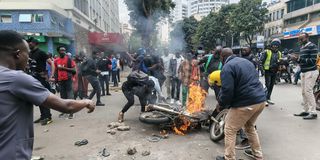Dorcas Odumbe: Why our unemployed young men are perfect prey for political manipulation

Chaos on Koinange Street in the Nairobi CBD as motorbike riders clashed with thugs carrying batons. The goons' bike was set on fire.
What you need to know:
- Desperate youths, paid to disrupt protests, reveal a broken system where survival trumps dignity, justice, and identity.
- Invisibility or destruction as young men face impossible choices in a nation that sells their future for political convenience.
I've been staring out of my office window on Kimathi Street for days now, trying to make sense of what I witnessed. The teargas has not cleared and questions linger. How did we get to a place where our young men are so desperate that Sh2,000 can buy their dignity, their safety, their future?
Tuesday started with hope. Gen Z protesters in branded T-shirts had gathered outside Nation Centre to pray for justice for Albert Ojwang'. These were our children at their best—organised, peaceful, purposeful. Then, like a switch had been flipped, they vanished. In their place came groups of young men on boda bodas, riding three or four to a bike, wielding rungus with military precision. This wasn't grief transformed into rage; this was choreographed chaos.
Later, we learned the choreography had been planned since Thursday. Political figures systematically recruited young men from informal settlements, using estate chairpersons and local coordinators as their procurement agents. “I was promised Sh2,000 and told that the police had been briefed, so they wouldn't harm us,” one recruit confessed afterward. Another admitted under duress: “We were paid Sh1,000 to disrupt the planned protests.”
Those amounts—Sh1,000, Sh2,000—haunt me. Not because they're small, but because for many of these young men, they represented hope. A chance to eat, to contribute, to matter. When society constantly reminds you that your worth is tied to your ability to provide, and the economy offers you nothing, someone offering you anything feels like salvation.
I keep thinking about my own sons. They're lucky—they have options, opportunities and a mother who understands their struggles. But what if they didn't? What if their only choice was between invisibility and someone offering them Sh2,000 to feel useful, even destructively so?
Something is particularly cruel about how we've set up this trap. We tell young men they must be providers and protectors, then create an economy where they can't fulfil either role honourably. When they struggle with the weight of these expectations, we tell them to “man up”. When they need help, we make therapy cost the same amount that politicians pay them to cause chaos. We price them out of healing, while others purchase their destruction at the same rate.
The irony cuts deeper when you realise the genuine protesters these young men were paid to disrupt were fighting for justice for someone just like them—a young man who died in police custody. They were weaponised against their own interests, their own generation's fight for accountability. This isn't just about Tuesday's chaos. It's about a system that has made our sons so vulnerable that they can be purchased and deployed like commodities. It's about communities where unemployment isn't just an economic problem; it's an identity crisis for young men who've been taught their value lies in their productivity.
Yet, I refuse to accept this as inevitable. The same energy that was weaponised for destruction can rebuild communities if we channel it right. We need job creation that goes beyond political promises, skills training that leads to real opportunities, and support systems that don't cost a fortune. Most importantly, we need to make it costly for politicians to exploit our children's desperation. When community leaders become procurement officers for political violence, we've lost something fundamental about what leadership means.
I watched our genuine protesters disappear from the streets on Tuesday, replaced by hired chaos. But I also saw them regroup, refuse to be silenced, insist on their right to seek justice peacefully. That gives me hope. Our sons deserve better than Sh2,000 and a motorcycle ride into someone else's war. They deserve futures worth fighting for, not against.


